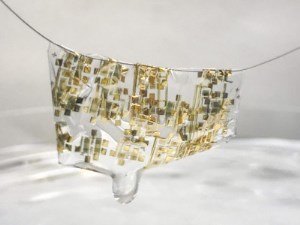



Date:05/05/17
 This wearable electronic device melts to nothing if you pour vinegar on it — and that’s by design. With 50 million metric tons of electronic waste projected for 2018, scientists at Stanford University created a biodegradable wearable that wouldn’t sit in the junk drawer or junkyard for the rest of eternity, once the next generation of Fitbit came along.
This wearable electronic device melts to nothing if you pour vinegar on it — and that’s by design. With 50 million metric tons of electronic waste projected for 2018, scientists at Stanford University created a biodegradable wearable that wouldn’t sit in the junk drawer or junkyard for the rest of eternity, once the next generation of Fitbit came along.
The result is one of the lightest, thinnest electronic devices that’s ever been made. The big advance was a biodegradable semiconductor the scientists synthesized from a molecule found in tattoo ink. They also created a new, extra-thin film made out of plant fibers, using it as a base to embed the device’s electronics in. That includes electrodes, made out of aluminum and iron, which melt away completely along with the rest of the device after 30 days in a liquid even less acidic than vinegar. The how-to manual for this new wearable was published Monday in the journal Proceedings of the National Academy of Sciences.
Eventually, the goal is to use this technology to store sensitive digital information that you’d want to be able to easily get rid of, or for implantable medical devices, biological sensors, and even prosthetic skins. So, to make sure that it wasn’t toxic to living tissue, the researchers stuck the device on mouse heart muscle cells in a dish for between two and six days. The cells didn’t die, fortunately, but the device will require further testing on both living lab animals and humans before anyone’s using it in the clinic.
Transient electronic devices could well be a boon for the planet, but you should take note now — if this is what the next generation of Fitbits and exercise trackers are going to be made of, then you might want to be careful with them around the salad dressing.
Scientists have created a lightweight wearable that dissolves in vinegar
 This wearable electronic device melts to nothing if you pour vinegar on it — and that’s by design. With 50 million metric tons of electronic waste projected for 2018, scientists at Stanford University created a biodegradable wearable that wouldn’t sit in the junk drawer or junkyard for the rest of eternity, once the next generation of Fitbit came along.
This wearable electronic device melts to nothing if you pour vinegar on it — and that’s by design. With 50 million metric tons of electronic waste projected for 2018, scientists at Stanford University created a biodegradable wearable that wouldn’t sit in the junk drawer or junkyard for the rest of eternity, once the next generation of Fitbit came along.The result is one of the lightest, thinnest electronic devices that’s ever been made. The big advance was a biodegradable semiconductor the scientists synthesized from a molecule found in tattoo ink. They also created a new, extra-thin film made out of plant fibers, using it as a base to embed the device’s electronics in. That includes electrodes, made out of aluminum and iron, which melt away completely along with the rest of the device after 30 days in a liquid even less acidic than vinegar. The how-to manual for this new wearable was published Monday in the journal Proceedings of the National Academy of Sciences.
Eventually, the goal is to use this technology to store sensitive digital information that you’d want to be able to easily get rid of, or for implantable medical devices, biological sensors, and even prosthetic skins. So, to make sure that it wasn’t toxic to living tissue, the researchers stuck the device on mouse heart muscle cells in a dish for between two and six days. The cells didn’t die, fortunately, but the device will require further testing on both living lab animals and humans before anyone’s using it in the clinic.
Transient electronic devices could well be a boon for the planet, but you should take note now — if this is what the next generation of Fitbits and exercise trackers are going to be made of, then you might want to be careful with them around the salad dressing.
Views: 356
©ictnews.az. All rights reserved.Similar news
- Justin Timberlake takes stake in Facebook rival MySpace
- Wills and Kate to promote UK tech sector at Hollywood debate
- 35% of American Adults Own a Smartphone
- How does Azerbaijan use plastic cards?
- Imperial College London given £5.9m grant to research smart cities
- Search and Email Still the Most Popular Online Activities
- Nokia to ship Windows Phone in time for holiday sales
- Internet 'may be changing brains'
- Would-be iPhone buyers still face weeks-long waits
- Under pressure, China company scraps Steve Jobs doll
- Jobs was told anti-poaching idea "likely illegal"
- Angelic "Steve Jobs" loves Android in Taiwan TV ad
- Kinect for Windows gesture sensor launched by Microsoft
- Kindle-wielding Amazon dips toes into physical world
- Video game sales fall ahead of PlayStation Vita launch





















